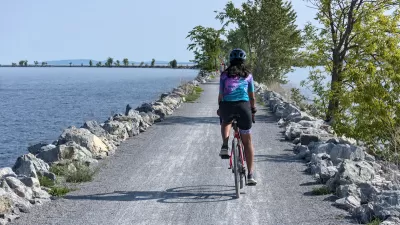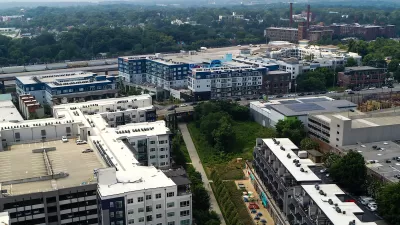CityLab presents a feature extravaganza about the nation's 21,000-mile-long network of trails converted from former rail lines.
Sarah Goodyear introduces a magazine style feature on "The Rails to Trails Legacy":
"The High Line, New York City’s famed linear park, made a huge splash when the first section of it opened in 2009. But the underlying concept behind it—the conversion of a disused rail corridor into a welcoming public space—didn’t come out of nowhere. The decades-old Rails-to-Trails movement had a major influence on the project, along with dozens more like it across the United States and around the world."
The feature moves along a timeline, starting in 1965, with the ebbing of the nation's widespread use of trains, and 1968, when the National Trails System Act gave Rails-to-Trails its first legislative support. The feature goes on to highlight some of the most famous examples of Rails-to-Trails conversions, all the way up to Chicago's Bloomingdale Trail, which opened earlier this summer.
Absent from the feature, however, is a mention of a controversial Supreme Court ruling from 2014 that undermined the legality of large portions of the national Rails-to-Trails network.
FULL STORY: The Rails to Trails Legacy

Planetizen Federal Action Tracker
A weekly monitor of how Trump’s orders and actions are impacting planners and planning in America.

Maui's Vacation Rental Debate Turns Ugly
Verbal attacks, misinformation campaigns and fistfights plague a high-stakes debate to convert thousands of vacation rentals into long-term housing.

San Francisco Suspends Traffic Calming Amidst Record Deaths
Citing “a challenging fiscal landscape,” the city will cease the program on the heels of 42 traffic deaths, including 24 pedestrians.

Defunct Pittsburgh Power Plant to Become Residential Tower
A decommissioned steam heat plant will be redeveloped into almost 100 affordable housing units.

Trump Prompts Restructuring of Transportation Research Board in “Unprecedented Overreach”
The TRB has eliminated more than half of its committees including those focused on climate, equity, and cities.

Amtrak Rolls Out New Orleans to Alabama “Mardi Gras” Train
The new service will operate morning and evening departures between Mobile and New Orleans.
Urban Design for Planners 1: Software Tools
This six-course series explores essential urban design concepts using open source software and equips planners with the tools they need to participate fully in the urban design process.
Planning for Universal Design
Learn the tools for implementing Universal Design in planning regulations.
Heyer Gruel & Associates PA
JM Goldson LLC
Custer County Colorado
City of Camden Redevelopment Agency
City of Astoria
Transportation Research & Education Center (TREC) at Portland State University
Jefferson Parish Government
Camden Redevelopment Agency
City of Claremont





























